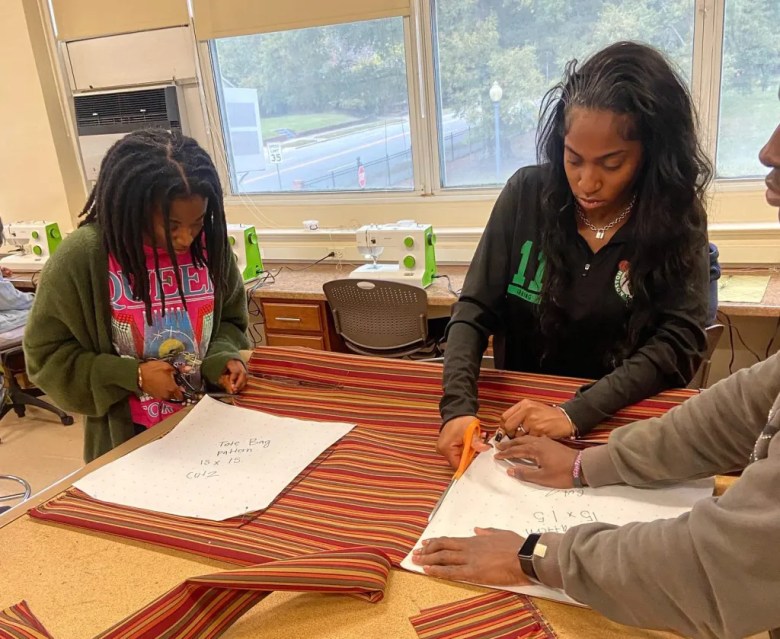Students at historically Black colleges and universities have flaunted distinctive looks on campus for decades.
Dressing in creative outfits helps HBCU students express themselves, and campuses embrace specific trends all their own, such as the resurgence of Y2K fashion, replacing backpacks with Marc Jacobs totes, and theme days like Monochromatic Mondays.
Taylor Davis, a Philadelphia native and junior at North Carolina A&T, says her sense of fashion and style has shifted since she arrived on campus. Feeling more free and aware of her style, she has more space to discover who she is.
For Davis, that means embracing early 2000s trends: the iconic combo of black lip liner and clear lip gloss, baby tees, mini skirts, and velour tracksuits.
“Fashion to me would just be like [representing] who I am,” she said. “I am a Black woman and I want to make that known in my fashion and in my fashion choices.”
Davis is the public relations coordinator for Fashion X-Cetera, a fashion club on campus. Fashion X-Cetera allows students to come together in their love for fashion. The club hosts sewing workshops, DIY events, and an annual fashion show.
For Davis, Fashion X-Cetera has become a space where she can learn about style and explore her interest in fashion.

Designated dress days are also common on campuses — like Durag Day, Telfar Tuesday, and professional dress Thursdays.
“HBCUs — and the Black community in general — we take our own spin, our own approach when it comes to fashion and style, and I love it,” said Savyon Foster, who graduated from Winston-Salem State University in 2016.
Respectability politics on campus
Fashion has always been important on HBCU campuses. Starting in the early 1920s, students regularly donned suits and fancy dresses — their “Sunday Best.”
The idea has its roots in respectability politics, experts said. Respectability politics is the idea that subscribing to mainstream norms of behavior and appearance can guard members of marginalized groups, especially Black people, from injustice and prejudices.
Read more: How Morehouse College Is Challenging What It Means to Be a Black Man
Wearing suits, ties, and dresses was a way for students at HBCUs to show people on the outside that they were intelligent and competent, said Akilah Carter-Francique, the dean of the School of Education, Health, and Human Services at Benedict College.
“Part of it was fighting the narrative of historical stereotypes that Black folks are lazy, Black folks are unintelligent,” she said. “And so fashion then, and I would even say now, is used in that respect.”
Showing personality
Students regularly play with color and bold motifs and accessories to make their outfits distinct. It’s not uncommon to see students wearing popular brand names like Jordans, True Religion, and Telfar, or graphic tees, tote bags, and cargo bottoms to class.
“When you’re looking at fashion specifically in sports, everyone kind of looks the same. But at HBCUs, people are going to freak whatever they wear,” said Foster, the Winston-Salem State University alumnus. He’s now an assistant professor at the University of Kansas and researches HBCUs and the Black sports experience.
Reflecting on his time as a student at Winston-Salem State, Foster described how students cut up shirts, and distressed or bleached various pieces.
“We’re like ‘OK, we’re going to show our school spirit, but we’re also going to add our personality to it,’” Foster said.
Read more: Case Western Reserve University’s Black students encourage each other to show up authentically
Still, even students who are comfortable expressing themselves through fashion, don’t always feel welcome to do so.
Morgan Page, a junior visual arts and media design major at N.C. A&T, draws inspiration from the emo and goth fashion scenes. Staples in her wardrobe include platform boots, distressed items, accessories, and lots of black and pink. When she arrived on campus, she realized that her style was something that many students had either not been exposed to or were not used to.
“It’s like, the emo or goth scene, all that is considered white people’s fashion. If you step into that territory, then all of a sudden, you’re whitewashed, and you’re not proud of your culture, which is not the case,” she said.
Those sentiments reflect how HBCU fashion is “not very diverse sometimes,” she said. “We’ve definitely put ourselves in boxes.”
But for Page — like many others — fashion is just a way to express herself.
“It’s just fun,” she said. “It’s interesting.”
Rosegalie Cineus is a fellow with the HBCU Student Journalism Network, a project of Open Campus.
